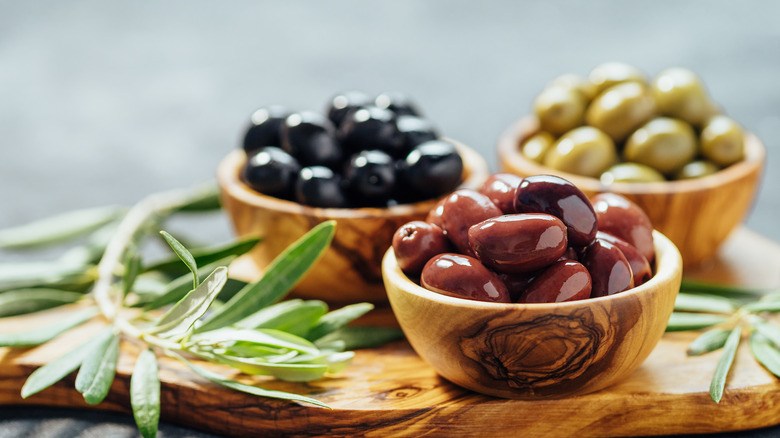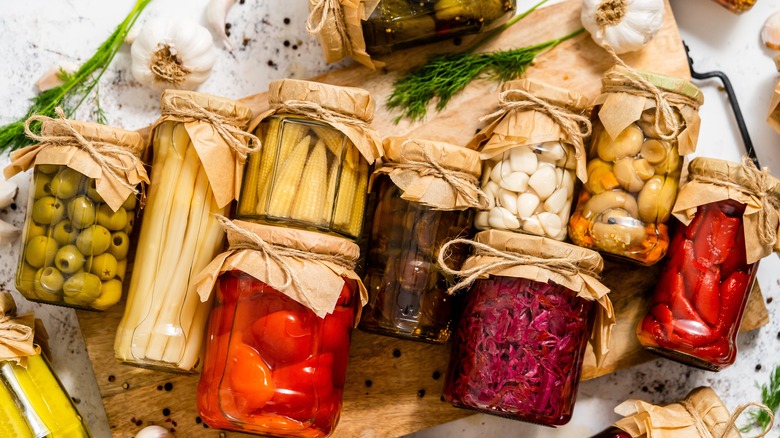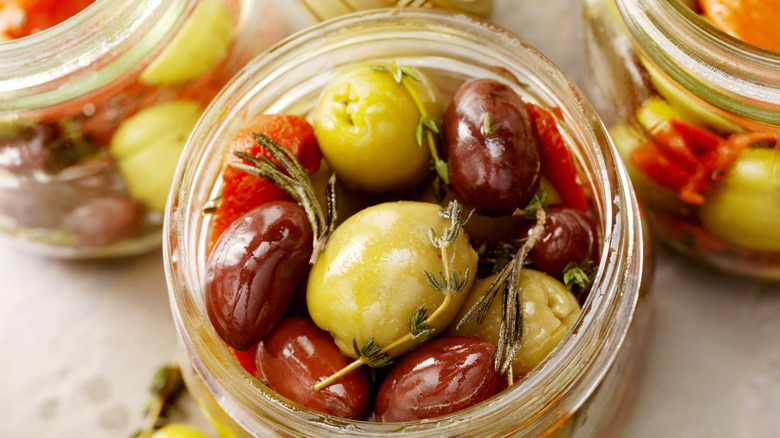The Mistake You Want To Avoid When Making Home-Canned Olives
Canning, preserving or pickling food all sound like old-fashioned ways to extend the life of seasonal fruits and vegetables. But even though food is now available year-round, thanks to food imports and refrigeration, there's value in learning how to make home-canned food by preserving food in jars at high temperatures. Cured olives, in particular, are a good return on time invested, as they provide intense pops of flavor for everything from chicken tagine to sandwiches. Olives can be cured in a variety of ways (e.g. oil-cured, water-cured, or brine-cured), which serves to transform the olives into a pickle. But whatever the method, it's important to know what utensils and canning jars you can and can't use. It might be tempting to use any spare or aesthetically pleasing container, but this is a rookie mistake.
Stay away from utensils or jars made from copper, brass or iron, as it will result in a chemical reaction that changes the flavor of the olives. In the worst case, consuming excessive copper over time can cause health issues.
Use utensils made from non-reactive materials
This all might sound scary, but science has a measured explanation. Copper is a reactive metal that can leach into food, especially when it comes into contact with acidic or alkaline substances. Fresh olives are alkaline and then become mildly acidic when pickled, which accelerates the process of copper leaching. This will make the final product taste metallic.
When canning olives, it's best to use non-reactive materials, such as stainless steel, glass, or enamel-coated containers and utensils. These materials won't interact with the acidic content of foods and will ensure the safety and quality of the canned products.
For example, Mason jars are the go-to jars for canning, as they can withstand the high pressure from the canning process. According to the National Center for Home Food Preservation, you can also recycle old mayonnaise or pickle jars, although there is a possibility of seal failures and jar breakage. For this reason, many guides simply recommend getting new canning jars.
Always sterilize canning jars before use
Canning food might sound simple, but it's more science than it is art. Minor details can affect both taste and food safety — there are a few more rules to remember, particularly in the use of utensils and jars. For example, the jars to store the cured olives must be sterilized before use. This means submerging the jars into a pot of hot (not boiling) water and then boiling it for 10 minutes to kill any bacteria or microorganisms present on the surfaces. Sterilize the lids as well. (It's important to make sure to follow sterilization directives to the letter, as there can be serious consequences, like botulism.)
Separately, prepare a brine for the olives using a ratio of 1 tablespoon of salt to 1 cup of boiling water. Place the olives in the still-warm jars, pour the brine over the olives, seal, and leave them to cool. This should last for at least six months.
As you become more familiar and confident with the process, you can experiment with different curing methods for different olive varieties, taking inspiration from the Italian, Spanish, or Greek ways.


